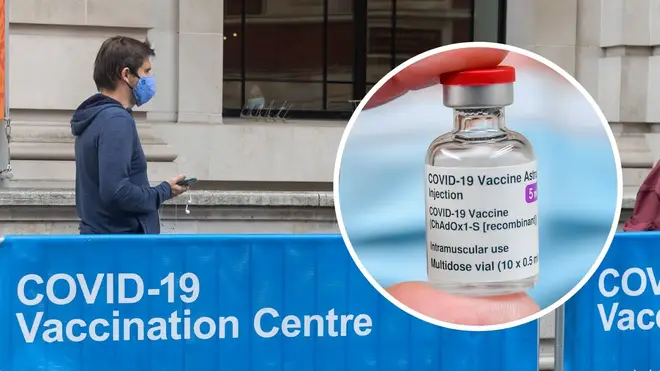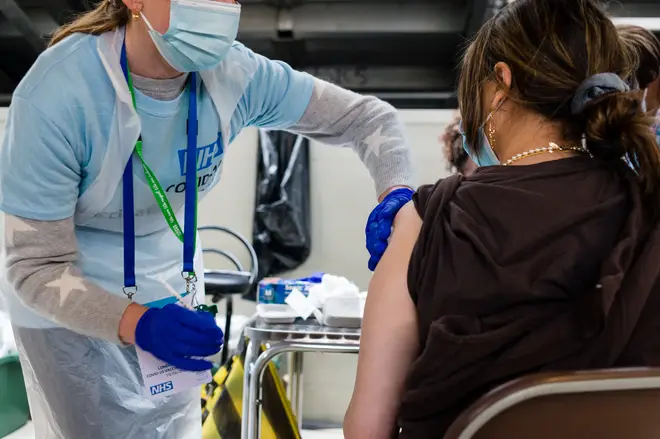
Nick Ferrari 7am - 10am
28 June 2021, 13:40

A third shot of the Oxford/AstraZeneca vaccine could be an effective booster jab against Covid-19 variants without the need for tweaks, new research has found.
An Oxford University study found that giving people a third dose more than six months after their second led to a substantial increase in antibodies and boosted the ability to fight coronavirus - including its variants.
Oxford Vaccine Group head, Professor Sir Andrew Pollard, said it is not yet known whether people will need a booster shot in the autumn but that the findings could mean it is effective.
Public Health England (PHE) data has previously shown that two doses offer good protection against hospitalisation and death from the Alpha variant first discovered in Kent and the Delta variant first identified in India.
READ MORE: Portugal tells British tourists: Isolate for 14 days if you aren't fully vaccinated
READ MORE: Sajid Javid to make statement on remaining Covid restrictions
But with two doses currently preventing more than 90% of hospital admissions, the professor said it is "difficult to say" whether a third dose could add a few more percent.
He added: "Boosters are much more about if protection gets lost over time - and we don't know that - but if it does, could you boost? And the answer to that from these data is yes, you could.
"There's no indication today that we need boosters, and it is something where we need to keep looking at the data and make decisions as the months go by, about whether that protection that we have is lost."

Professor Pollard said experts will "expect to see immunity start to wane over time because that does happen" but it will not go back "down to zero".
He added: "Our immune systems are a bit too clever for us to just look at those numbers... the immune system remembers that we've been vaccinated and so, even if we meet the virus some months later, the immune system remembers it, will kick in and make stronger immune responses again and hopefully that will protect most people from severe disease.
"So that's why I say we just have to watch at the moment to make those decisions (on whether boosters are needed), based on the best evidence as it emerges."
READ MORE: 'Children are being blamed': Calls for change to Covid isolation rules in schools
Teresa Lambe, associate professor at the Jenner Institute at Oxford, said that, regarding antibody responses with a third dose, "we were able to push them up to a level that we saw at the peak of the response after the second dose".
She added: "This is very encouraging because we've already demonstrated that two doses of (the vaccine) is both efficacious and effective in the real world.
"We also saw an increase in the neutralising antibodies against a number of variants, so we were able to demonstration increased neutralising antibodies with a third dose against Alpha, Beta and Delta."

The Beta variant first identified in South Africa has been worrying scientists, she explained.
"Here we show that a third dose of (the vaccine) is well-tolerated and significantly boosts the antibody response," Prof Lambe added.
"This is very encouraging news, if we find that a third dose is needed."
Asked about the Beta variant, she said it is difficult to say what "specific level of neutralising antibody is needed" as there is not yet any clear data.
In the preprint study, which has yet to be peer-reviewed, some 90 people received a third dose of the vaccine, which was well-tolerated in terms of side-effects.
The study also found that a longer delay of up to 45 weeks between the first and second dose of the Oxford/AstraZeneca vaccine leads to enhanced immune response.
READ MORE: Hundreds of walk-in Covid-19 vaccine sites open in England this weekend
Prof Pollard said the findings should come as "reassuring news to countries with lower supplies of the vaccine, who may be concerned about delays in providing second doses to their populations".
He added: "There is an excellent response to a second dose, even after a 10-month delay from the first."
It comes after AstraZeneca and the University of Oxford began new clinical trials on Sunday to test a modified vaccine against the Beta variant.
The booster vaccine trial will involve around 2,250 participants from Britain, South Africa, Brazil and Poland.